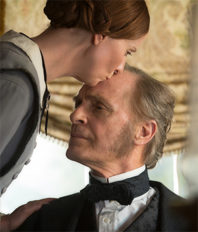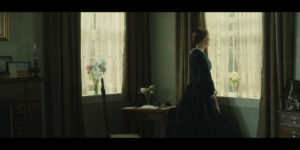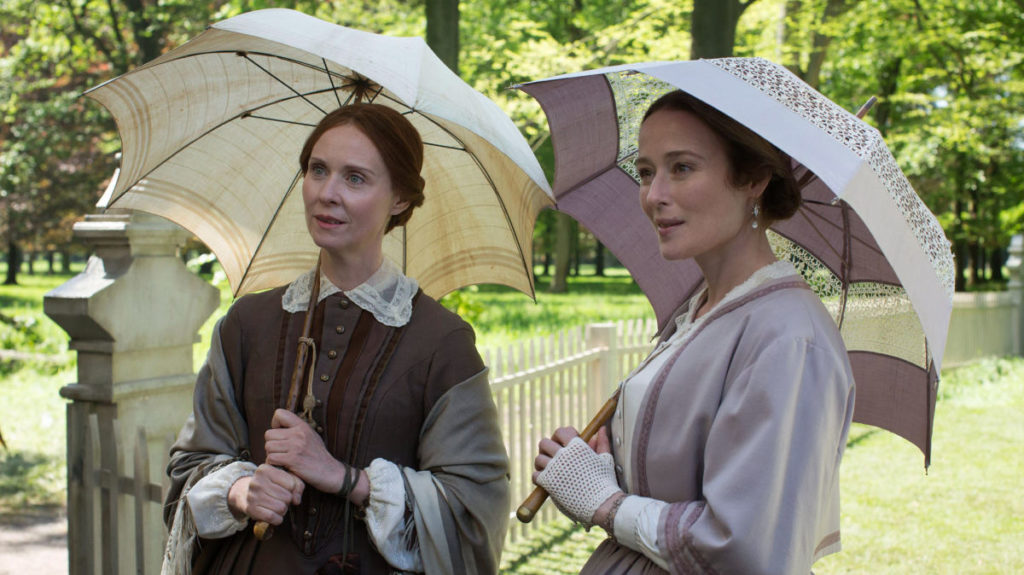
Terence Davies’ filmography betrays a certain versatility. He can make documentaries like Of Time and the City. He can adapt plays like The Deep Blue Sea. But he returns to his bread and butter by writing and directing the biopic of 19th century poet Emily Dickinson. There’s a part of me that rejoices whenever Davies releases a film. I’m sure that it excites some people to see him tackle the the life of the 19th century poet. It follows movies about poets like The Colour of Pomegranates, Before Night Falls, and Bright Star.
Other audiences, however, would hurriedly assume that an art house movie about the gilded age would be a slow ride. The film never felt slow for me. Davies packs his film with lines that the actors shout at one another. And there lies my initial ambivalence towards a film that depicts such people. This is a film about people who love conflict. And this time around, Davies might be enjoying filming the characters’ bickering more than usual. How seriously should I take some aspects of the dialogue? Do I take its depiction of Christianity as a sincerely oppressive force or as camp?
Is Dickinson the latest in Davies’ list of troubled female protagonists? The opening scene, when a young Dickinson (Emma Bell) argues against her Christian teacher. This argument leads her family to rescue her from that teacher and Mount Holyoak, the school that confines her. This shows the film’s and Davies’ main thematic concerns. That this is going to be a film about her views on religion. There’s also how much her family has tolerated her. She starts out as a radical. But like most people, her views permutate and so do the views of her siblings.
Davies examines what makes Dickinson both shrink and blossom artistically. He also lays the groundwork for that examination in another early scene. She and family listen to an operatic singer. There she has to hear remarks from her father (Keith Carradine) negating a woman’s presence on the stage. Emily also has to hear her aunt Elizabeth (Annette Badland) speak ill of English as a terrible language for song. She defies these cues but she still internalizes them. She knows that she has both being a woman and being an American against her. Davies shows the limits of American exceptionalism.
Though sometimes these negative thoughts fuel her poetry. Elizabeth and her mother’s (Joanna Bacon) fatalist fascination with death reflects her own interest in the subject. Emily also gets some freedom within her household. One night, she asks her father permission to write poetry – an antiquated request, yes. She also gets him to pass on her work to an editor friend of his. An adult Emily (Cynthia Nixon) is also close to other women in her life. Her greatest friends include her sister Vinnie (Jennifer Ehle) and sister-in-law Susan (Jodhi May), who provide moral perspectives for Emily.
Davies uses his supporting characters and cast well, but everything hinges on Nixon’s portrayal of the poet. The first time we experience her grace is through her voice-over recitations of Dickinson’s poems. And she takes her time to relish every word. It runs against what people have taught me to do with Dickinson’s verses. Nixon also brings out the eroticism in Dickinson’s poems about death that I’ve never seen before. She competently depicts the self-sabotage that I see introverts practice. She also brings out a physicality we don’t expect from a performance in a period film.
Nixon does her best with the dialogue as the rest of the cast does. They have to wrestle with words so mannered I only expected someone like Davies to write them. But as unnaturalistic as the words are, they’re also witty. They reflect the humourous one-upsmanship that we can still find in Western culture today. He wrote most of those lines for Emily’s friend Vyrling Buffham (Catherine Bailey). This aspect of the film leaves such a mark even when Vyrling leaves and the comedy turns into tragedy. When Emily grows old and her witty lines turn into hurtful insults, part of me still cheered for her.
- Release Date: 4/14/2017


